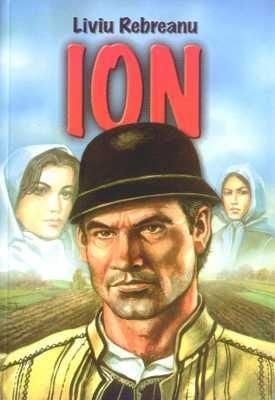
- John
- Published by: Pentru Literatură
- Level: Beginner
- First Published in: 1920
Ion (or John) is believed to be one of the most powerful examples of Romanian literature. The novel is a monograph of the realities of a Transylvanian village in the early 20 th century. It illustrates the conflicts generated by fierce struggles for land in a world where man’s social status is determined by the wealth he possesses.

Liviu Rebreanu (1885-1944) was a Romanian novelist, playwright , and member of the Romanian Academy . He’s considered the creator of the modern Romanian novel, and Ion (or John) is believed to be one of the most powerful examples of Romanian literature. It was published in 1920, after a long period of development (as the writer himself mentions at the end, from March 1913 to July 1920). Rebreanu began writing it based on real facts and then transfigured them in his work.
The novel is a monograph of the realities of a Transylvanian village in the early 20th century. It illustrates the conflicts generated by fierce struggles for land in a world where man’s social status is determined by the wealth he possesses.
"Its modernism lies in the complexity of its narrative construction and in its large number of characters."
It is organized in two parts, “The Voice of Land” and “The Voice of Love,” reflecting the protagonist’s conflicting passions: land and love. The story is about the struggle of a poor peasant – Ion – to obtain land, along with the consequences of his actions. It begins on a Sunday, when the villagers of Pripas dance. The prevailing mindset among them is that people are respectable if they have some savings, which strains social relations between “sărăntoci” (poor men) and “bocotani” (regionalism: rich men).
Ion is in love with Florica, a beautiful but poor girl. Because her financial condition is not good, Ion decides to make Ana – an ugly girl with many houses and lots of land – fall in love with him. Her father, Vasile Baciu, does not like Ion because he is poor and wants to take advantage of Ana’s wealth. Ion decides to take revenge upon Vasile Baciu by impregnating Ana, in order to marry her. After the wedding, Ion abuses Ana until she commits suicide, leaving behind a baby a few months old who shortly dies too. Indifferent about the death of Ana, Ion is determined to conquer Florica, the love of his life. But further tragedy awaits.
Rebreanu’s language is distinguished by several features. He uses precise, accurate, and brief expressions in his search for truth, objectivity, and realism. His style is sober and devoid of artistic images, while his prose is accessible and accompanied by many regionalisms, like “ traistă ” (the correct form is “sacoşă”, meaning “bag”) and “sălbatecă” (the correct form is “sălbatică”, meaning “wild”), or archaisms (old-fashioned words) like “humă” (clay or loam) and “chiabur” (rich man).

